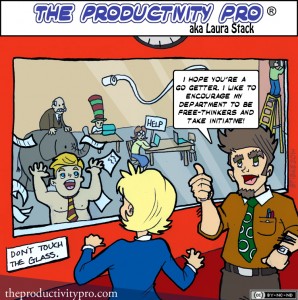 You’ve probably heard Grace Hopper’s famous axiom, “It’s better to beg forgiveness than ask permission.” As a child, my father used to tell me that all the time! As a pioneering computer scientist and one of the first female admirals in the U.S. Navy, “Amazing Grace” surely learned the value of begging forgiveness rather than asking permission during her long, storied career. Indeed, Hopper’s Law seems to make a lot of sense in many real-world situations. But is it applicable to the workplace?
You’ve probably heard Grace Hopper’s famous axiom, “It’s better to beg forgiveness than ask permission.” As a child, my father used to tell me that all the time! As a pioneering computer scientist and one of the first female admirals in the U.S. Navy, “Amazing Grace” surely learned the value of begging forgiveness rather than asking permission during her long, storied career. Indeed, Hopper’s Law seems to make a lot of sense in many real-world situations. But is it applicable to the workplace?
The answer, as with so many other business questions, is, “It depends.” There are reasonable arguments for both sides of the equation, depending on the circumstances. For example, if you’re an IT tech, you definitely want to ask permission before changing or upgrading the operating system of an important server. On the other hand, if you’re a mid-level executive who asks your superior before making every little decision, you’re going to drive her crazy with your lack of initiative and confidence. At this leadership level, you need to have the grit and wit to do the job you were hired to do without constantly asking for permission.
The forgiveness/permission quandary isn’t something all of us face daily, but you’ll certainly encounter it on a regular basis. Ideally, whether you ask for permission first or forgiveness later would be situational, based on all the factors involved in the decision, after you’ve closely examined and carefully weighed each one. This is especially true of high-level decisions, especially when considered against your position in the organization. An intern shouldn’t decide where his multinational buys IT equipment, for example. Those decisions belong to executives and high-level managers. For anyone unqualified by virtue of position and/or experience, unwillingness to ask permission before making such moves comes across as both arrogant and stupid.
All that said, I have to come down on the side of forgiveness for ordinary decisions. Your team members need to understand they don’t have to ask your permission to do every little thing—that you count on them to take their initiative with everyday decisions. As long as they hold the line on productivity and performance, little else matters. I’ve told my office manager that I want her to make decisions about what to post on our Facebook page each day, because it’s a trivial detail with a very low priority for me, but it has a high value for her, since it needs to be done.
Worker initiative forms the basis of the two E’s, empowerment and engagement. When workers not only feel allowed but encouraged to own their jobs, they take their work to heart and care more about not just their own small purview, but also about the entire organization and their place in it. More importantly, they care about how their efforts move the team and organization forward toward their respective goals.
Within broad boundaries, then, allow your team members to take initiative not only on minor issues, but also on larger issues that can profit the entire team or the whole organization. I’ve basically told my office manager, “Unless you have a problem you can’t handle that absolutely requires my input, just figure it out!” When team members can do this in a non-punitive environment, they’re much more likely to try.
What do you think the balance is between begging for forgiveness or asking for permission?
© 2014 Laura Stack. Laura Stack, MBA, is America’s Premier Expert in Productivity™. For over 20 years, Laura has worked with business leaders to execute more efficiently, boost performance, and accelerate results in the workplace. Her company, The Productivity Pro, Inc., provides productivity workshops around the globe to help attendees achieve Maximum Results in Minimum Time®. Laura is the bestselling author of six books, with over 20 foreign editions, published by Random House, Wiley, and Berrett-Koehler, including her newest work, Execution IS the Strategy (March 2014). Widely regarded as one of the leading experts in the field of performance and workplace issues, Laura has been featured on the CBS Early Show, CNN, the Wall Street Journal, and the New York Times. Connect via her website, Facebook, or Twitter.



Trust must be considered when the question of asking permission is considered. To function ethically and efficiently you need to be trusted. Obviously you do not need permission to do the routine matters of your job. However, if something is beyond your job description, you need to be sure that you have permission. This is especially truth when you first start a job. As trust grows between you, your superior, and your co-workers, you will have a greater freedom to make decisions without permission. Except in emergencies, the best policy for keeping trust is to ask permission when in doubt.